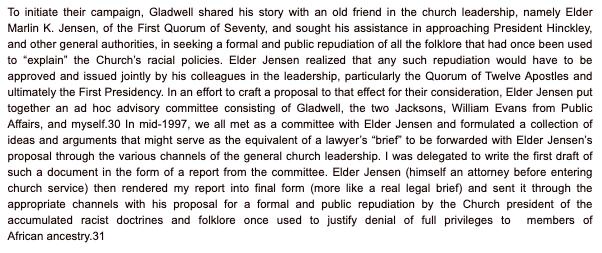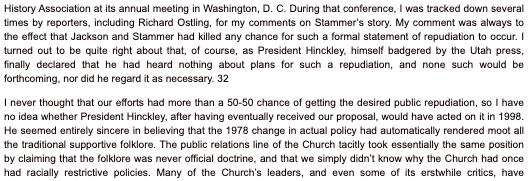Armand Mauss discusses efforts to campaign church leadership to repudiate ban.
- Type
- Website
- Source
- Armand L. Mauss LDS
- Hearsay
- DirectReprint
- Reference
Armand Mauss, "An Abortive Campaign Against the Folklore," Juvenile Instructor, February 21, 2013, https://web.archive.org/web/20130615062022/https://juvenileinstructor.org/black-history-month-at-the-ji-an-abortive-campaign-against-the-folklore-mauss/ <accessed May 15, 2021>
- Scribe/Publisher
- Juvenile Instructor (blog)
- Audience
- Reading Public
- Transcription
To initiate their campaign, [Dennis] Gladwell shared his story with an old friend in the church leadership, namely Elder Marlin K. Jensen, of the First Quorum of Seventy, and sought his assistance in approaching President Hinckley, and other general authorities, in seeking a formal and public repudiation of all the folklore that had once been used to “explain” the Church’s racial policies. Elder Jensen realized that any such repudiation would have to be approved and issued jointly by his colleagues in the leadership, particularly the Quorum of Twelve Apostles and ultimately the First Presidency. In an effort to craft a proposal to that effect for their consideration, Elder Jensen put together an ad hoc advisory committee consisting of Gladwell, the two Jacksons, William Evans from Public Affairs, and myself.[30] In mid-1997, we all met as a committee with Elder Jensen and formulated a collection of ideas and arguments that might serve as the equivalent of a lawyer’s “brief” to be forwarded with Elder Jensen’s proposal through the various channels of the general church leadership. I was delegated to write the first draft of such a document in the form of a report from the committee. Elder Jensen (himself an attorney before entering church service) then rendered my report into final form (more like a real legal brief) and sent it through the appropriate channels with his proposal for a formal and public repudiation by the Church president of the accumulated racist doctrines and folklore once used to justify denial of full privileges to members of African ancestry." "I was tracked down several times by reporters, including Richard Ostling, for my comments on Stammer’s story. My comment was always to the effect that [David] Jackson and [Larry] Stammer had killed any chance for such a formal statement of repudiation to occur. I turned out to be quite right about that, of course, as President Hinckley, himself badgered by the Utah press, finally declared that he had heard nothing about plans for such a repudiation, and none such would be forthcoming, nor did he regard it as necessary. I never thought that our efforts had more than a 50-50 chance of getting the desired public repudiation, so I have no idea whether President Hinckley, after having eventually received our proposal, would have acted on it in 1998. He seemed entirely sincere in believing that the 1978 change in actual policy had automatically rendered moot all the traditional supportive folklore. The public relations line of the Church tacitly took essentially the same position by claiming that the folklore was never official doctrine, and that we simply didn’t know why the Church had once had racially restrictive policies.
The B. H. Roberts Foundation is not owned by, operated by, or affiliated with the Church of Jesus Christ of Latter-day Saints.


